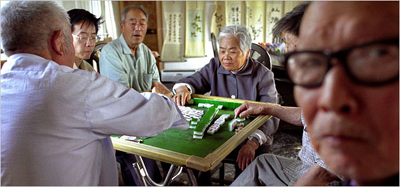http://www.nytimes.com/2006/06/30/world/asia/30aging.html?pagewanted=1&ei=5094&en=92530c7ed24b728e&hp&ex=1151726400&partner=homepage
Shanghai is rightfully known as a fast-moving, hypermodern city - full
of youth and vigor. But that obscures a less well-known fact: Shanghai has the
oldest population in China, and it is getting older in a hurry.
The courtyard of the Minsheng Nursing Home. Residents pay the equivalent of
US$100 a month to live there.

Residents playing mah-jongg in the Minsheng
Nursing Home in northern Shanghai. Founded in 1998, it has 350 beds, which
are now 95 percent occupied. The city is in the forefront of a nationwide
aging trend. [The New York Times] |
Twenty percent of this city's people are at least 60, the common retirement
age for men in China, and retirees are easily the fastest growing segment of the
population, with 100,000 new seniors added to the rolls each year, according to
a study by the Shanghai Academy of Social Sciences. From 2010 to 2020, the
number of people 60 or older is projected to grow by 170,000 a year.
By 2020 about a third of Shanghai's population, currently 13.6 million, will
consist of people over the age of 59, remaking the city's social fabric and
placing huge new strains on its economy and finances.
The changes go far beyond Shanghai, however. Experts say the rapidly graying
city is leading one of the greatest demographic changes in history, one with
profound implications for the entire country.
The world's most populous nation, which has built its economic strength on
seemingly endless supplies of cheap labor, China may soon face manpower
shortages. An aging population also poses difficult political issues for
the government, which first encouraged a population explosion in the 1950's
and then reversed course and introduced the so-called one-child policy a few
years after the death of Mao in 1976.
That measure has spared the country an estimated 390 million births but may
ultimately prove to be another monumental demographic mistake. With China's
breathtaking rise toward affluence, most people live longer and have fewer
children, mirroring trends seen around the world.
Those trends and the extraordinarily low birth rate have combined to create a
stark imbalance between young and old. That threatens the nation's rickety
pension system, which already runs large deficits even with the 4-to-1 ratio of
workers to retirees that it was designed for.
Demographers also expect strains on the household registration system, which
restricts internal migration. The system prevents young workers from migrating
to urban areas to relieve labor shortages, but officials fear that abolishing it
could release a flood of humanity that would swamp the cities.